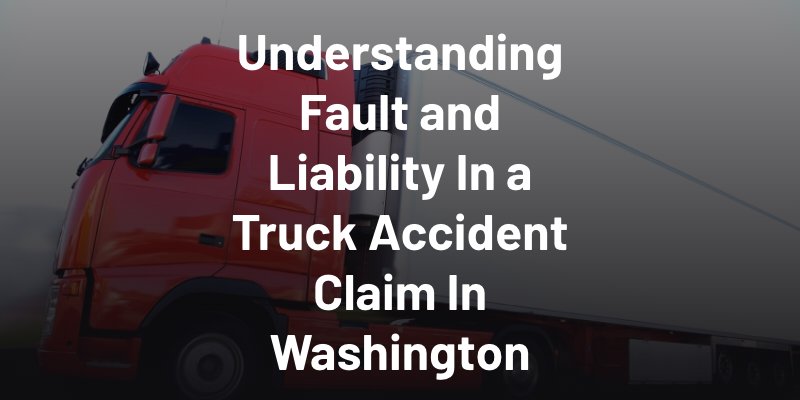
Washington has a fault-based insurance system that requires accident victims to file compensation claims against the at-fault party to recover damages like property damage, medical expenses, lost wages, and compensation for pain and suffering. This law also applies to accidents involving large commercial trucks. Fully loaded commercial trucks weigh up to 80,000 pounds, far outweighing standard passenger cars at an average of 4,000 pounds, and placing motorists in smaller vehicles at risk of grave injuries.
A successful accident claim requires the injury victim to prove the at-fault party’s liability through a preponderance of the evidence with the help of a truck accident lawyer in Marysville.
Common Causes of Washington Truck Accidents
It takes many involved parties making all reasonable efforts to ensure that safe trucks are on the roadways navigated by well-trained, rested, drivers. It only takes one party’s negligence to result in a truck accident with devastating results to others on the roadway. Common causes of truck accidents in Washington and elsewhere include the following:
- Distracted driving
- Speeding
- Drowsy driving
- Unsafe lane changes
- Improper merging
- Tailgating
- Failure to yield the right of way
- Improperly secured/unbalanced loads
- Mechanical problems/negligent maintenance and repairs
- Defective truck or trailer parts
- Drunk driving
All components of the trucking industry are regulated by the Federal Motor Carrier Safety Administration (FMCSA). Failure to adhere to these important regulations is negligence and leaves the negligent party liable for damages to injury victims, like medical expenses, lost wages, and compensation for pain and suffering.
Liable Parties in Washington Truck Accident Cases
It often takes a diligent investigation to determine the cause or contributors to a truck accident and identify the liable party—or multiple parties who share portions of the liability. Common liable parties in Washington truck accidents include the following:
- The driver
- The trucking company
- A negligent freight loading company
- A negligent truck manufacturing company
- The manufacturer of a defective truck part
- A negligent truck maintenance company
Less commonly, the investigation reveals that a third party was at fault, such as a negligent road maintenance agency or a third-party driver. When a negligent or reckless action results in a truck accident, the insurance company of the liable party must pay compensation for damages to injury victims.
What are the Legal Factors of Liability In Truck Accident Cases?
Proving liability for a truck accident requires showing evidence of negligence, or that an involved party did not take the reasonable care expected of them. The injury victim must show the following through a preponderance of the evidence:
- That the at-fault party owed a duty of care to take all reasonable measures to prevent causing injuries to others
- They breached this duty through an act of negligence, recklessness, or wrongdoing
- Their breach of duty directly caused the accident and injuries
- The injury victim suffered damages from the injury
If the accident resulted from a defective tire or truck part, the manufacturer is under strict liability, meaning it isn’t necessary to prove negligence, only that the part had a design defect or manufacturing mistake and the defect caused the accident.
How Can A Washington Truck Accident Lawyer Help?
At Wells Trumbull, we are compassionate legal advocates for injury victims and commonly take on even the largest trucking companies and their insurance companies to obtain the best results for our injured clients. Call a personal injury lawyer in Marysville for experienced representation, invaluable resources, and cutting-edge legal counsel to maximize your compensation through prompt action on your behalf. Contact us today for a free consultation.